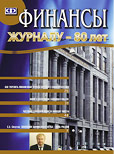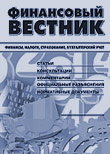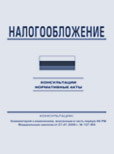Cодержание
Финансы и бюджет: проблемы и решения
Е.Е. Чернякова, директор Департамента информационных технологий в сфере управления государственными и муниципальными финансами и информационного обеспечения бюджетного процесса
E-mail: Elena.Chernyakova@minfin.ru
В статье рассматривается процесс создания и развития государственной интегрированной информационной системы управления общественными финансами «Электронный бюджет». Основная цель системы – обеспечить прозрачность, открытость и подотчетность деятельности госорганов и органов управления государственными внебюджетными фондами, органов местного самоуправления, государственных и муниципальных учреждений. Одновременно система призвана повысить качество их финансового менеджмента за счет формирования единого информационного пространства и применения информационных технологий и телекоммуникационных технологий в сфере управления государственными и муниципальными (общественными) финансами.
Ключевые слова: электронный бюджет, бюджетное планирование, бюджетные ассигнования, модуль, подсистема.
Е.И. Андреева, старший научный сотрудник Центра бюджетной политики Научно-исследовательского финансового института Минфина России
E-mail: andreeva@nifi.ru
Д.Г. Бычков, кандидат социологических наук, ведущий научный сотрудник Центра
E-mail: bychkov@nifi.ru
О.А. Феоктистова, кандидат экономических наук, старший научный сотрудник Центра
E-mail: feoktistova@nifi.ru
В программных документах Правительства РФ достижение социального благополучия и социального согласия, снижение поляризации в обществе заявлены как важнейшие цели социально-экономического развития, а реализация социальной политики по поддержке уязвимых слоев населения рассматривается как один из важнейших путей достижения этих целей. Кроме того, с учетом сложившихся социально-экономических условий все активнее обсуждается вопрос о необходимости повышения эффективности бюджетных расходов в сфере социальной защиты граждан и усиления принципа адресности при предоставлении мер социальной поддержки.
Рассматривая нынешнюю систему мер социальной поддержки населения в контексте опыта 25-летних реформ в России и опыта зарубежных стран, авторы выносят на рассмотрение возможные направления повышения адресности данной системы.
Ключевые слова: государственные социальные расходы, эффективность бюджетных мер в сфере социальной поддержки населения, адресная социальная помощь, социальные выплаты и льготы, социальные гарантии.
В.В. Ильин, доктор экономических наук, профессор, главный научный сотрудник Государственного научно-исследовательского института системного анализа Счетной палаты Российской Федерации
E-mail: vladimir_v_ilyin@hotmail.com
Статья посвящена рассмотрению теоретических и практических вопросов формирования и обслуживания государственного долга субъектов РФ и муниципальных образований; взаимосвязи долговой политики субъектов федерации и региональной экономической динамики. Основная часть работы посвящена вопросам российской практики заимствований на региональном уровне: рассматриваются инструменты и виды долговых обязательств, варианты и типы проводимой долговой политики с учётом специфики экономического развития и бюджетной ситуации в различных регионах РФ. Дается оценка динамики общего долга и структуры государственного долга субъектов Российской Федерации за ряд последних лет и причины его роста в 2013 и 2014 годах. Доказывается, что определение приоритетов долговой политики является неотъемлемым элементом формирования бюджетной политики региона или муниципального образования.
Ключевые слова: долговая политика, кредитная иллюзия, бюджет, государственный долг, краткосрочная задолженность, перманентная задолженность, дефицит бюджета, долговые обязательства, бюджетные кредиты, банковские кредиты, коммерческие кредиты, ценные бумаги, рефинансирование государственного долга.
А.А. Михайлова, начальник отдела Института реформирования общественных финансов, кандидат экономических наук
E-mail: aam@irof.ru
В августе 2015 г. Институт реформирования общественных финансов (ИРОФ) в двенадцатый раз провел традиционные Августовские чтения по общественным финансам в России. Тема Чтений – «Бюджет для стратегии или стратегия для бюджета» – задана тем, что в настоящее время Российская Федерация вступает в новую фазу формирования долгосрочных стратегических планов социально-экономического развития. Этот процесс охватывает как федеральный, так и региональный и муниципальный уровни. Участники дискуссии обсудили вопросы соотнесения долгосрочных стратегий, государственных программ и бюджета, отражения финансовых ресурсов в региональных стратегиях и увязки бюджета и научно-технологического прогноза.
Ключевые слова: Августовские чтения по общественным финансам в России, государственные программы, стратегическое и бюджетное планирование.
Казначейство: становление и развитие
А.И. Лукашов, заместитель руководителя УФК по г. Москве, кандидат экономических наук, доцент
E-mail: ailuka@yandex.ru
В статье автор проводит анализ законодательных и нормативно-правовых актов, регулирующих вопросы казначейского сопровождения государственных контрактов. Практические аспекты казначейского сопровождения рассмотрены на примере проведения операций со средствами, получаемыми юридическими лицами из федерального бюджета в форме субсидий, бюджетных инвестиций, взносов в уставные капиталы. В материале также определены возможные перспективные направления развития казначейского сопровождения государственных контрактов.
Ключевые слова: эффективность и результативность бюджетных расходов, казначейское сопровождение государственных контрактов, целевые средства.
На вопросы читателей отвечают специалисты Минфина России и Федерального казначейства.
Налоги: теория и практика
E-mail: finance-journal@mail.ru
Минфин представил на обсуждение проект Основных направлений налоговой политики Российской Федерации на 2016 г. и на плановый период 2017 и 2018 гг. Документ не является нормативным актом, но он содержит глубокий и критический анализ налоговой политики прошлых лет, предложения о возможных коррективах, которые в ближайшие три года могут быть внесены в законодательство, новые идеи и концепции. Что особенно ценно, приводятся статистические данные о динамике налоговых поступлений, ставится вопрос об эффективности налоговых льгот. Сквозной идеей материала является установка на неповышение налоговой нагрузки на экономику в целом, что не исключает ее перераспределения между отраслями, регионами, группами компаний.
Ключевые слова: бюджет, налоговые поступления, мораторий, налоговый маневр, льготы и освобождения, администрирование.
Т.И. Семкина, старший научный сотрудник Центра налоговой политики Научно-исследовательского финансового института Минфина России
Т.А. Логинова, младший научный сотрудник Центра
E-mail: nifi.loginova@gmail.com
ПСН и ЕНВД относятся к тому типу условно-расчетного налогообложения, который основан на использовании специальных показателей для определения размера налога и эффективности работы малого бизнеса. На основе анализа действующей практики взимания этих двух налогов сделан вывод о необходимости трансформации действующей формы ПСН в систему налогообложения в виде ЕНВД; разработки новой формы патентной системы для конкретных профессий вне зависимости от размера, оборота бизнеса (в том числе для физических лиц, не являющихся индивидуальными предпринимателями).
Ключевые слова: условно-расчетное налогообложение, типы ПСН и ЕНВД, особенности, недостатки, преимущества.
Страхование
Э.С. Гребенщиков, кандидат исторических наук
E-mail: finvestnik@mail.ru
В целях повышения устойчивости финансовой системы международные регуляторы и организации (G20 и Совет по финансовой стабильности) разработали правила идентификации системно значимых глобальных страховых компаний, имея в виду установление над ними в дальнейшем усиленного режима контроля, который повышал бы надежность страховщиков и устранял риски дестабилизации всей финансовой сферы. В статье анализируются противоречивая реакция на эти шаги самих затронутых ими участников рынка, которым придется нести расходы на достижение повышенных нормативов, а также критерии отбора и состав группы системно значимых участников глобального страхового рынка. Также уделяется внимание тому, какие формы принимает контроль над крупнейшими участниками страхового рынка в России.
Ключевые слова: G 20, системная значимость, финансовая стабильность, страховые компании, абсорбция риска, взаимосвязанность.
С.В. Дедиков, старший партнер Общества страховых юристов, преподаватель РАНХиГС при Президенте РФ
E-mail: Dedikov.SV@mail.ru
Автор описывает правовые риски, возникающие у страховщиков при страховании ответственности членов саморегулируемых организаций в области строительства. Он предлагает закрепить в ст. 60 Градостроительного кодекса РФ право потерпевшего на выбор способа возмещения вреда – через предъявление требования собственнику, концессионеру, застройщику или техническому заказчику либо непосредственно деликвенту.
Ключевые слова: гражданская ответственность, страховщик, возмещение вреда, регредиент, регрессат.
Д.А. Горулев, заместитель заведующего кафедрой страхования и управления рисками Санкт-Петербургского государственного экономического университета, доцент
E-mail: gorulev@finec.ru
Статья посвящена исследованию актуарных и андеррайтинговых проблем ценообразования на страховые услуги в контексте предупреждения банкротства страховщиков. Исследуются специфика финансов страховщика, выявляются проблемы в резервировании в условиях нерепрезентативности страхового портфеля и его несоответствия страховому полю. Предложены направления совершенствования резервирования.
Ключевые слова: андеррайтинг, актуарные расчеты, страховые резервы, ценообразование, финансы, капитал.
Annotation
E.E. Chernyakova, director of Department of Information technology in the sphere of public and municipal finance management and informational support of budget process.
E-mail: Elena.Chernyakova@minfin.ru
Article considers the process of creation and development of the state integrated informational system of public finance management “Electronic budget.” The main purpose of the system is to ensure transparency, openness and accountability of the state bodies and bodies of management of the state off – budget funds, bodies of local government, state and municipal establishments. At the same time the system is designed to improve the quality of their financial management at the expense of formation of a single information space and use of information technologies and telecommunication technologies in the sphere of state and municipal (public) finance management.
Keywords: electronic budget, budget planning, budget assignation, module, subsystem.
E.I. Andreeva, senior researcher of the Center for Budgetary Policy of the Financial Research Institute of the Ministry of Finance of Russia.
E-mail: andreeva@nifi.ru
D.G. Bychkov, PhD in sociology, leading researcher of the Center for Budgetary Policy of the Financial Research Institute of the Ministry of Finance of Russia
Email: bychkov@nifi.ru
O.A. Feoktistova, PhD in economics, senior researcher of the Center for Budgetary Policy of the Financial Research Institute of the Ministry of Finance of Russia.
E-mail: feoktistova@nifi.ru
In its strategic documents the Government of the Russian Federation has declared that achieving social wellbeing and reducing social polarization are primary goals of national socio-economic development, and that the implementation of social policy targeted at protecting vulnerable citizenry is one of the most important ways of attaining this goal. Also, given the social-economic conditions in Russia, the issue of increasing the efficiency of government outlays in the area of social protection and strengthening the principle of targeted provision of social benefits more and more often comes to the foreground of public debates.
Presenting the existing system of social benefits in the context of 25 years of social reforms in Russia and international practices of social protection, the authors suggest policy options for implementing a more targeted approach to combating poverty in Russia.
Keywords: public expenditures on social protection, efficiency of budget measures in the sphere of public protection, targeted social assistance, social benefits, social guarantees.
V.V. Ilyin, Doctor of economic sciences, professor, senior research officer of the State Research Institute of System Analysis of the Account Chamber of the Russian Federation
E-mail: vladimir_v_ilyin@hotmail.com
Article is devoted to consideration of theoretical and practical aspects of formation and service of a public debt of territorial subjects of the Russian Federation and municipalities; interrelations of debt policy of subjects of federation and regional economic dynamics. The main part of work is devoted to questions of the Russian practice of loans at the regional level: tools and types of debt obligations, options and types of the pursued debt policy taking into account specifics of economic development and the budgetary situation in various regions of the Russian Federation are considered. The assessment of dynamics of a total debt and structure of a public debt of subjects of the Russian Federation for a row of the last years and the reason of its growth in 2013 and 2014 is given. Article proves that the definition of priorities of debt policy is an integral element of formation of budget policy of the region or municipality.
Keywords: debt policy, credit illusion, budget, public debt, floating debt, permanent debt, budget deficit, debt instruments, budget loans, bank loans, commercial credit, securities, refinancing the public debt.
A.A. Mikhaylova, head of department of the Institute for Public Finance Reform, senior lecturer at RANEPA, candidate of economic sciences
E-mail: aam@irof.ru
In August 2015 the Institute for Public Finance Reform (IROF) for the twelfth time held traditional August readings on public finance in Russia. The theme of the Readings - “Budget for strategy or strategy for budget” was selected because at the present time Russian Federation is entering new phase of formation of long – term strategic plans for socio – economic development. This process covers both Federal and regional and municipal levels. Participants discussed the questions of correlation of long – term strategies, state programs and budget, reflection of financial resources in regional strategies and correlation of budget and scientific and technological forecast.
Keywords: August readings on public finance in Russia, state programs, strategic and budget planning.
E-mail: finance-journal@mail.ru
Ministry of Finance presented a draft of the Main directions of tax policy of the Russian Federation for 2016 and planned period 2017 and 2018. Document is not a normative act but it contains a deep and critical analysis of tax policy of the past years, proposals for possible adjustments which can be introduced into legislation in the next three years, new ideas and concepts. It is especially valuable that the article cites statistical data about the dynamics of tax revenues and puts a question about the efficiency of tax benefits. One of the ideas of the material is non – increase of tax burden on the economy in general, which is not excluding its redistribution between sectors, regions and groups of companies.
Keywords: budget, tax revenues, moratorium, tax maneuver, benefits and exemptions, administration.
T.I. Semkina, senior research officer of the Tax Policy Center of the Financial Research Institute.
T.A. Loginova, junior research officer of the Center
E-mail: nifi.loginova@gmail.com
PST and UTII can be assigned to the type of presumptive taxation, based on the usage of specific indicators (external features) while determination of the tax rate and evaluation of effectiveness of small business. On the basis of analysis of current practice of charging of these two taxes it was concluded that there is a necessity of transformation of the current acting form of the PST into taxation system in the form of UTII and of development of a new form of the patent system for specific professions, regardless of size and turnover of the business (including individuals, who are not individual entrepreneurs).
Keywords: presumptive taxation, types of PST (patent system of taxation) and UTII (unified tax on imputed income of individual entrepreneurs), specifications, disadvantages, advantages.
N.S. Milogolov, research associate at Tax policy centre, Scientific and Research Financial Institute under the Ministry of Finance of the Russian Federation, PhD in Economics (candidate)
K.N. Tserenova, research associate at Tax policy centre, Scientific and Research Financial Institute under the Ministry of Finance of the Russian Federation, PhD in Economics (candidate)
E-mail: NMilogolov@nifi-abik.ru
The article provides an overview of reports prepared by participants of the expert roundtable «Novel legislation on controlled foreign companies (CFC) taxation rules and voluntary declaration of assets». It describes practical implications of recent changes in legislation concerning taxation of controlled foreign companies (CFC) and following the new federal law on voluntary declaration of property. Also it provides the results of analysis of national legislation in the light of BEPS OECD/G20 recommendations.
Keywords: controlled foreign companies, anti-avoidance legislation, voluntary declaring of assets, tax administration.
D.A. Gorulev, deputy head of chair “Insurance and risk management” of the Saint Petersburg State University of Economics, associate professor.
E-mail: gorulev@finec.ru
In this article the actuarial and underwriting problems of insurance pricing concerning insolvency prevention are examined. The author explains his interpretation of the capitalisation and financing of insurance companies, the process of tarification on the Russian market. He considers also the issue of underreservation caused by inconsistencies between insurance portfolio and insurance field as a whole, offers improvements of reservation guidelines.
Keywords: insurance, underwriting, actuarial math, underwriting policy, insurance reserves, insurance rates, insurance pricing, finance, capital.
E.S. Grebenschikov, candidate of historical sciences.
E-mail: finvestnik@mail.ru
Global regulators and organizations, first of all the Financial Stability Board (was established by G20) have been lately engaged in elaborating the rules of the identification of global systemically important insurers (G-SIIs), nine of them were named. They will be placed under enhanced oversight to eliminate the risks to the global financial system and strengthen its stability. The author traces the varying reactions of G-SIIs to this title which implies among other things the possibility of tighter and more costly oversight in the near future. Dr. Grebenshchikov also describes the implementation of G20 and IAIS recommendations by Russian megaregulator and their inclusion in the Russian legislation.
Keywords: G20, systemic importance, financial stability, insurance companies, risk absorption, interconnection.
S.V. Dedikov, senior partner of the Society of Insurance Lawyers, lecturer of the Russian Presidential Academy of National Economy and Public Administration
E-mail: Dedikov.SV@mail.ru
Author describes the legal risks faced by insurers while insuring the liability of SRO members in the construction sphere. He proposes to enshrine in the article № 60 of the Town-planning Code of the Russian Federation the right of victim to select the method of compensation through producing the demands to owner, concessionaire, developer or technical customer or directly to delinquent.
Keywords: civil liability, insurer, reparation of damages, regredient, person liable to recourse.













